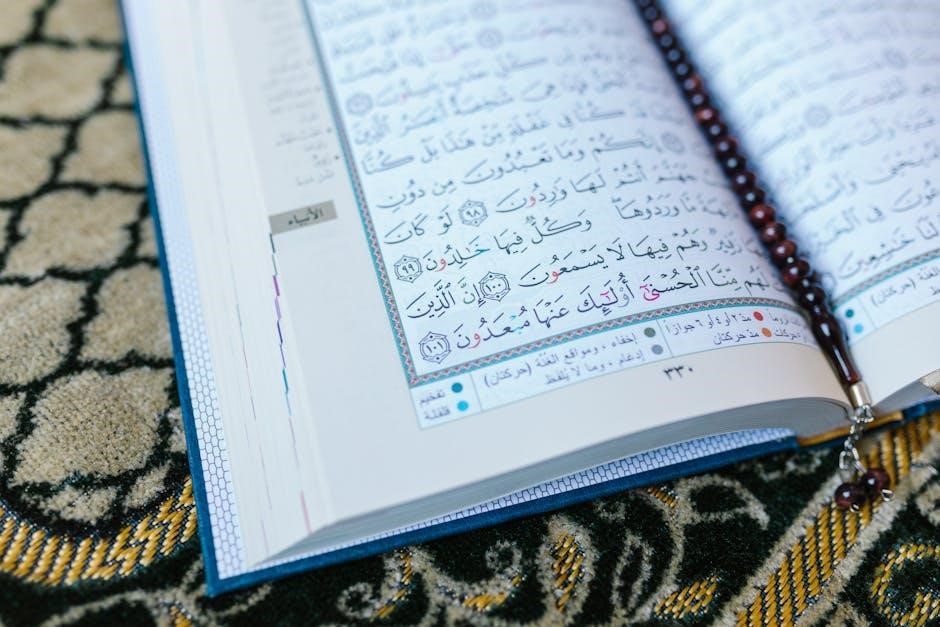The Ninety Nine Names of Allah, known as Asma ul Husna, are divine attributes central to Islamic faith, derived from the Quran and Hadith, guiding worship and understanding Allah’s nature.
Overview of the Asma ul Husna
The Asma ul Husna are the 99 beautiful names of Allah, central to Islamic faith, describing His divine attributes of mercy, power, and wisdom. Derived from the Quran and Hadith, these names guide believers in understanding Allah’s nature, fostering a deeper connection and strengthening faith. They are integral to worship and supplication, reflecting Allah’s perfection and divine character, and are often used in daily prayers and supplications to seek blessings and guidance.
Significance in Islamic Faith
The Asma ul Husna hold profound spiritual and theological significance, reflecting Allah’s divine attributes of mercy, justice, and wisdom. They are central to worship, guiding believers in understanding Allah’s nature and fostering a deeper connection. Muslims invoke these names in prayers and supplications, seeking blessings, guidance, and comfort, which strengthens their faith and relationship with Allah, embodying the essence of Islamic spirituality and devotion.
Origin and Sources of the 99 Names
The 99 Names of Allah, known as Asma ul Husna, originate from the Quran and Hadith, describing His divine attributes and worship.
Quranic References
The 99 Names of Allah are deeply rooted in the Quran, with explicit mentions in verses like Surah Al-A’raf (7:180) and Surah Taha (20:8). These names describe Allah’s divine attributes, such as mercy, power, and wisdom, guiding believers in understanding His nature and worship.
Hadith and Prophetic Teachings
The Hadith emphasizes the importance of the 99 Names of Allah, with Prophet Muhammad (peace be upon him) encouraging their use in supplication. A notable Hadith highlights that memorizing and acting upon these names leads to Paradise. Teachings also stress invoking Allah’s names with sincerity, as they reflect His divine attributes and mercy, guiding believers in worship and daily life.

Meaning and Significance of Each Name
Each of the 99 Names of Allah conveys unique divine attributes, guiding believers in worship, supplication, and life. Understanding these names deepens one’s spiritual connection to Allah.
Attributes and Characteristics of Allah
The 99 Names of Allah reveal His divine attributes, such as mercy, forgiveness, power, and wisdom. Each name highlights a unique characteristic, like Ar-Rahman (The Most Gracious) and Al-Malik (The King), guiding believers in understanding Allah’s nature and fostering a deeper connection through worship and reflection. These attributes emphasize His perfection and sovereignty, inspiring reverence and devotion in the hearts of Muslims worldwide.
Role in Worship and Supplication
The 99 Names of Allah are deeply integrated into Islamic worship, used in prayers, supplications, and Dhikr (remembrance of Allah). Invoking these names strengthens spiritual connection, seeking divine mercy and guidance. Muslims often recite them in daily rituals, believing it enhances the effectiveness of their prayers and fosters a meaningful relationship with Allah, aligning their hearts with His divine attributes and blessings.

Popular PDF Resources and Guides
Various PDF resources are available, including flashcards, printables, and translations. Platforms like Etsy and Internet Archive offer downloadable guides, such as “99 Names of Allah PDF” and “Asma e Husna Tarjuma,” providing Arabic-English translations and colorful designs for easy learning and worship.
99 Names of Allah Flashcards and Printables
99 Names of Allah Flashcards are popular tools for memorization, available on platforms like Etsy. These printables feature Arabic names with English translations, often in colorful designs. Ideal for both kids and adults, they simplify learning Allah’s divine attributes. Many resources, such as “Asma ul Husna Flashcards,” include PDF formats for easy printing. They serve as a visual aid for worship and spiritual growth, making memorization engaging and accessible.
Free PDF Downloads and Translations
Free PDF downloads of the 99 Names of Allah are widely available, offering Arabic text, English translations, and meanings. Platforms like Etsy and Internet Archive provide accessible resources, such as “Asma ul Husna PDF” and “Allah 99 Names PDF.” These documents aid memorization, worship, and understanding, making Allah’s divine attributes accessible for spiritual growth and reflection.

Understanding the Names in Arabic and English
The 99 Names of Allah are deeply rooted in Arabic, the language of the Quran, preserving their divine essence. English translations enhance accessibility, helping non-Arabic speakers grasp their profound meanings and significance in worship and reflection.
Importance of Arabic in Islamic Texts
The Arabic language holds a sacred place in Islam as the tongue of the Quran and the Prophet Muhammad (peace be upon him). The 99 Names of Allah are originally revealed in Arabic, preserving their divine essence and linguistic beauty. Reciting and studying them in Arabic is highly encouraged, as it maintains their spiritual depth and connects believers to the Islamic tradition and heritage.
English Translations for Broader Accessibility
English translations of the 99 Names of Allah provide global accessibility, enabling non-Arabic speakers to understand and connect with Allah’s divine attributes. These translations maintain the spiritual essence while making the names comprehensible worldwide. They are widely used in PDF guides, flashcards, and educational materials, fostering worship, supplication, and personal spiritual growth among diverse Muslim communities.

Spiritual and Emotional Impact
The 99 Names of Allah deeply inspire spiritual upliftment and emotional comfort, strengthening one’s connection to the Divine, fostering hope, and providing solace in times of need.
Connection to Divine Mercy and Forgiveness
The 99 Names of Allah embody divine mercy and forgiveness, offering believers comfort and solace. Reciting these names strengthens one’s connection to Allah, fostering a sense of hope and trust in His benevolence. Understanding their meanings provides deeper insight into Allah’s compassionate nature, guiding believers to seek forgiveness and refuge through sincere devotion and heartfelt supplication.
Comfort and Guidance Through the Names
The 99 Names of Allah serve as a profound source of comfort and guidance for believers, offering solace in times of distress. By reciting and reflecting on these divine attributes, Muslims find peace and direction, deepening their connection to Allah. The names remind believers of His mercy and wisdom, providing emotional and spiritual support in their faith journey and daily lives.
Significant Names and Their Meanings
The 99 Names of Allah include Al-Wahhab (The Bestower) and Al-Razzaq (The Provider), embodying His generosity and sustenance. These names inspire believers, reflecting divine mercy and provision in faith and life.
Ar-Rahman (The Most Gracious) and Al-Quddus (The Holy One)
Ar-Rahman signifies Allah’s boundless mercy and grace, embracing all creation. Al-Quddus highlights His absolute purity and transcendence. Together, these names inspire awe and devotion, reminding believers of Allah’s perfect nature and eternal holiness, while encouraging humility and righteousness in worship and daily life.
Al-Malik (The King) and Al-Qadir (The Powerful)
Al-Malik emphasizes Allah’s sovereignty and dominion over all creation, while Al-Qadir highlights His absolute power and ability to fulfill all decrees. These names underscore Allah’s supreme authority and omnipotence, inspiring believers to submit to His will and trust in His infinite capability, fostering a profound sense of reverence and reliance on His divine power and wisdom.
Practical Applications in Worship
Believers incorporate the 99 Names into daily prayers, supplications, and Dhikr, seeking divine guidance and blessings. This practice strengthens spiritual connection and enhances worship, fostering humility and devotion to Allah’s magnificence and mercy, while providing comfort and solace in times of need.
Using the Names in Daily Prayers
Muslims invoke Allah’s Names during prayers, reciting specific attributes like Ar-Rahman and Al-Malik in salah, and using them in personal supplications. This practice deepens spiritual connection, fostering humility and devotion. The Names are often recited in Friday sermons, emphasizing their role in worship and daily life, while guiding believers to seek divine mercy and forgiveness through consistent remembrance and heartfelt prayer.
Supplication and Dhikr Practices
Reciting Allah’s Names in supplication (dua) and dhikr is a powerful way to seek divine mercy and forgiveness. Believers use specific Names like Ar-Rahman and Al-Hadi to invoke blessings and guidance. This practice strengthens spiritual connection, fostering mindfulness of Allah’s attributes and encouraging devotion. Regular remembrance through these Names is a cherished Islamic tradition, enhancing faith and humility in worship.
Cultural and Historical Significance
The 99 Names of Allah are deeply rooted in Arabic, the language of revelation, ensuring their divine meanings remain preserved and authentically understood in Islamic worship.
Influence on Islamic Art and Literature
The 99 Names of Allah have profoundly inspired Islamic art and literature, with intricate calligraphy and poetic compositions reflecting their divine beauty. Sufi poetry often incorporates these names to convey spiritual devotion, while artists use them as themes in manuscripts and architectural designs, blending faith with creative expression to honor Allah’s attributes and deepen cultural connections.
Historical Use in Muslim Practices
The 99 Names of Allah have been a cornerstone in Muslim practices for centuries, used in daily supplications, prayers, and spiritual reflection. Historically, scholars and believers have relied on these names to deepen their connection with Allah, seeking guidance and blessings. Their recitation has been a timeless practice, passed down through generations, emphasizing their role in worship and spiritual growth.

Common Questions and Misconceptions
Common questions involve the permissibility of reciting the Names and their proper usage. Misconceptions include beliefs about restrictions on non-Muslims and casual use of the Names, emphasizing their sacred role in worship and supplication.
Permissibility of Reciting the Names
Reciting the 99 Names of Allah is permissible and highly encouraged in Islam. Muslims are recommended to use these names in worship, supplication, and remembrance. The Names are a means to connect with Allah, seek His blessings, and understand His divine attributes. Proper recitation with respect and understanding is essential to benefit spiritually from this sacred practice.
Restrictions on Non-Muslim Usage
Non-Muslims are generally prohibited from using the 99 Names of Allah in certain contexts, such as worship or invocation, as these names are considered sacred and exclusive to Islamic worship. The use of Allah’s names is reserved for Muslims to maintain reverence and theological integrity, reflecting Islamic teachings on divine exclusivity and respect for sacred terminology.

Digital Resources and Accessibility
Digital resources like PDFs and e-books of the 99 Names of Allah are widely available online, offering easy access for learning and worship through popular platforms like Etsy and Internet Archive.
E-books and Digital Libraries
E-books and digital libraries offer convenient access to the 99 Names of Allah, with PDFs and downloadable resources available on platforms like Etsy and Internet Archive. These resources provide Arabic texts, English translations, and explanations, making them invaluable for learning and worship. Many are free, ensuring accessibility for a global audience seeking to deepen their understanding of Allah’s divine attributes.
Mobile Apps for Learning
Mobile apps dedicated to the 99 Names of Allah provide interactive tools for learning, featuring flashcards, pronunciation guides, and quizzes. These apps often include Arabic scripts, English translations, and meanings, making them accessible for both children and adults. Available on iOS and Android, they offer a convenient way to memorize and understand the divine attributes of Allah, enhancing spiritual growth and worship practices.
Community and Communal Practices
Muslim communities often engage in group recitations of the 99 Names of Allah during gatherings and events, fostering unity and spiritual connection. Mosques organize discussions and educational programs to deepen understanding and promote communal worship.
Group Recitations and Events
Muslim communities organize group recitations of the 99 Names of Allah during special events, fostering spiritual unity and connection. These gatherings, often held in mosques or community centers, include dhikr sessions and reflective discussions. Such events strengthen faith and provide a collective platform for worship, education, and inspiration, emphasizing the importance of communal practices in Islamic spirituality.
Mosque Discussions and Educational Programs
Mosques often host educational programs and discussions focused on the 99 Names of Allah, offering insights into their meanings and significance. Scholars lead interactive sessions, exploring how these divine attributes guide believers in worship and daily life. Such programs foster a deeper understanding and connection to Allah, while also strengthening community bonds and spiritual growth among participants.
Exploring the 99 Names of Allah enriches one’s spiritual journey, deepening understanding and connection with the Divine. Embrace these sacred attributes to strengthen faith, guide worship, and seek divine mercy; Utilize PDF resources and educational materials to continue learning and incorporating these beautiful names into daily life for spiritual growth and inspiration.
Final Thoughts on the Importance
The 99 Names of Allah are a cornerstone of Islamic faith, offering profound insights into Allah’s divine attributes. They serve as a meaningful way to connect with the Divine, fostering spiritual growth and deepening understanding. These sacred names guide worship, supplication, and daily life, emphasizing Allah’s mercy, power, and wisdom. Embracing them enriches one’s relationship with Allah, inspiring devotion and humility.
Call to Explore and Utilize the Names
Embrace the 99 Names of Allah to deepen your spiritual connection and understanding of His divine attributes. Utilize PDF resources and flashcards to memorize and reflect on these sacred names. Incorporate them into worship, supplication, and daily life for guidance and inspiration. Let these names be a pathway to fostering a closer relationship with Allah and seeking His mercy and blessings.



